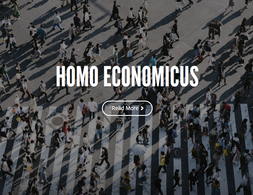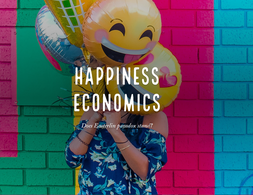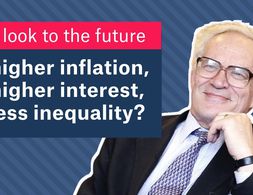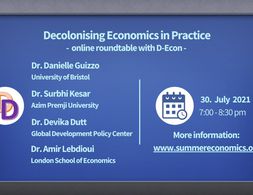✕
443 results
What is game theory? Game theory is a way of thinking about strategic interactions between people, which makes it a crucial component of economics, political science, international relations, psychology and a variety of other disciplines that deal with the complexities of human interaction in decision making.
Have you ever wondered why it is so difficult to follow through on new year’s resolutions, such as to exercise more or to start saving more money towards retirement? The agent that most traditional economic models are based on would not struggle to keep up these resolutions. These agents are referred to as homo economicus.
Happiness economics is a branch in behavioral economics, where it explores the economics factors and consequences of happy humans. What makes people happier, and what benefits do we get when people are happier? This dossier introduces you to the field of happiness economics, from a review of economic factors proposed to influence people’s happiness, to a discussion of the economic consequences of happiness, and concludes with economic policy implications of happiness economics.
Exploring Economics, an open-source e-learning platform, giving you the opportunity to discover & study a variety of economic theories, topics, and methods.
Teaching and learning ontology and epistemology. Onto-what? Bates & Jenkins explain what is needed to equip students with the ability to critically reflect on learned content and understand meta-discussions in their field.
The Money View Symposium was hosted by YSI on 5-7 February, 2021. The Symposium showcased the work of scholars and practitioners that make use of the so-called Money View, ranging from economists to lawyers, politicians and social scientists at large. The symposium aims to illuminate the main tenets of the Money View and to demonstrate its juxtaposition to the mainstream.
This course provides a simple introduction to problems that social scientists are working on (e.g. racial disparities, inequality and climate change) in a manner that does not require any prior background in Economics or Statistics.
This book argues that mainstream economics, with its present methodological approach, is limited in its ability to analyze and develop adequate public policy to deal with environmental problems and sustainable development. Each chapter provides major insights into many of todays environmental problems such as global warming and sustainable growth.
This groundbreaking collection explores the profound power of Social Reproduction Theory to deepen our understanding of everyday life under capitalism. It tackles issues such as child care, health care, education, family life and the roles of gender, race and sexuality, and shows how they are central to understanding the relationship between economic exploitation and social oppression.
Including contributions by: Lise Vogel, Nancy Fraser, David McNally and Susan Ferguson.
How Covid Shook the World s Economy Deftly weaving finance politics business and the global human experience into one tight narrative a tour de force account of 2020 the year that changed everything from the acclaimed author of Crashed The shocks of 2020 have been great and small disrupting the …
Economics should schematically explain the key elements and main strands of this core part of social life: the actual workings of our economies. This book argues that orthodox, modern neoclassical economics does not fulfil this core task. Standard economics models do not address the real functioning of our market economies, but rather an imagined economy.
The Great Recession 2.0 is unfolding before our very eyes. It is still in its early phase. But dynamics have been set in motion that are not easily stopped, or even slowed. If the virus effect were resolved by early summer—as some politicians wishfully believe—the economic dynamics set in motion would still continue. The US and global economies have been seriously ‘wounded’ and will not recover easily or soon. Those who believe it will be a ‘V-shape’ recovery are deluding themselves. Economists among them should know better but are among the most confused. They only need to look at historical parallels to convince themselves otherwise.
How can we establish new institutions and practices in order to use fare-free public transport as a beacon for sustainable mobility and a low-carbon lifestyle? The author of this essay elaborates on how practice theory and institutional economics can help to answer this question.
This is an overview of (possibly transformative) proposals to address the economic consequences of the corona crisis
This article reviews insights of existing literature on global care chains. A specific focus is laid on the impact that the refugee crisis has on global care chains and in turn how the crisis impacts the de-skilling of the women in the migrant workforce.
The general idea of a Job Guarantee (JG) is that the government offers employment to everybody ready, willing and able to work for a living wage in the last instance as an Employer of Last Resort. The concept tackles societal needs that are not satisfied by market forces and the systemic characteristic of unemployment in capitalist societies. Being a central part of the Modern Monetary Theory (MMT), attention for the JG concept rose in recent years.
Dependency in Central and Eastern Europe - Self-reliance and the need to move beyond economic growth
In this essay, the author takes a critical perspective on the pursuit of growth as the solution for providing for environmental sustainability and economic stability in the countries of Central and Eastern Europe.
Drawing from the framework of dependency theory and presenting brief insights into European core-periphery relations the author then argues for the implementation of an alternative strategy to development that is built around the concept of self-reliance.
Marx’s theory of the falling rate of profit is not only empirically borne out, but the theory he proposed seems to describe accurately how that happens. Furthermore, the whole process is useful for understanding the history of contemporary capitalism.
Exploring Economics, an open-access e-learning platform, giving you the opportunity to discover & study a variety of economic theories, topics, and methods.
The outbreak of COVID-19 has substantially accelerated the digitalization of the economy. Yet, this unprecedented growth of digital technology brought novel challenges to the labour market. Rise in income inequalities and precarious working conditions or polarization of jobs. In this essay, we try to assess what tools to use to counter these trends.
How do people make decisions? There is a class of models in psychology which seek to answer this question but have received scant attention in economics despite some clear empirical successes. In a previous post I discussed one of these, Decision by Sampling, and this post will look at another: the so-called Fast and Frugal heuristics pioneered by the German psychologist Gerd Gigerenzer. Here the individual seeks out sufficient information to make a reasonable decision. They are ‘fast’ because they do not require massive computational effort to make a decision so can be done in seconds, and they are ‘frugal’ because they use as little information as possible to make the decision effectively.
After completing the module, participants should be able to have general overview on the theory of commons. They can differentiate between neoclassical, new institutional and social/critical commons theory and can use these theories to assess real life common-pool resource management and commoning pratices.
Finance at the Threshold offers a unique perspective from an English economic and monetary historian. In it the author asks: Why did the banks stop lending to one another, and why now? Was it merely a matter of over-loose credit due to the relaxation of traditional prudence, or did global finance find itself at its limits?
This classic text offers a broader intellectual foundation than traditional principles textbooks. It introduces students to both traditional economic views and their progressive critique.
Happy International Women s Day This International Women s Day 2018 is an opportune moment to highlight prominent scholars of Feminist Economics As a subdiscipline of economics Feminist Economics analyzes the interrelationship between gender and the economy often critiquing inequities and injustices perpetuated by mainstream paradigms Work of this nature …
This collection of videos offers a short introduction to ecological economics and its main differences with respect to environmental economics.
This lecture offers a general and introductory overview of the theory of racial capitalism, focusing on the origins of racial capitalism and some of the debates it has generated.
Understanding international trade is central to economics and is currently a hot political issue. It’s an area where popular perceptions of mainstream economics are low, since they have historically missed some important downsides of trade agreements, especially the hollowing out of former manufacturing hubs in the Western world. et economists have for long time had a theory of trade with an impressive amount of scientific clout behind it: the gravity trade model.
“Economics is the science which studies human behaviour as a relationship between ends and scarce means which have alternative uses1.” This is how Lionel Robbins came to define economics in the early 1930s and there is a good chance that many of you heard a variant of this definition in your first Economics 101 lecture.
Recent events such as the Black Lives Matter protests the the murder of George Floyd in Minneapolis US and the toppling of the statue of Edward Colston in Bristol UK have exposed existing racism colonialism and sexism in our society and in Economics While calls to improve diversity in Economics …
Finance. Climate. Food. Work. How are the crises of the twenty-first century connected?In "Capitalism in the Web of Life", Jason W. Moore argues that the sources of today's global turbulence have a common cause: capitalism as a way of organizing nature, including human nature.
Florian Kern replies to Zoltan Pozsar's analysis about the effects of the war in Ukraine on the global financial order and refutes the latter's prognosis of the demise of the US dollar as the world's reserve currency
We use cookies on our website. Click on Accept to help us to make Exploring Economics constantly better!































